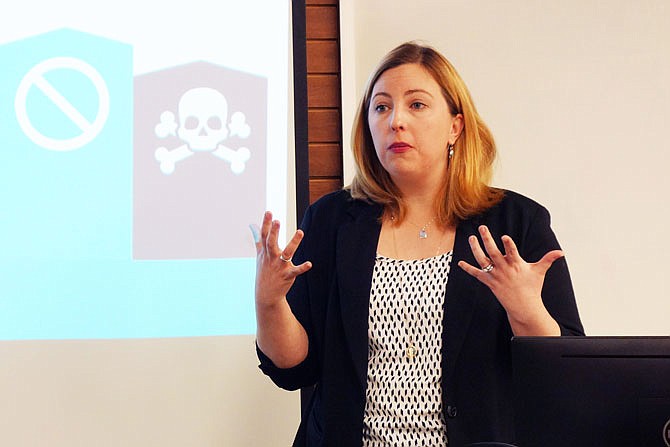The #MeToo movement swept the country last year, with thousands coming out as victims of sexual violence.
Virginia Mohammed, who works with sex and domestic violence offenders through Missouri Coalition Against Domestic and Sexual Violence, thinks the movement got so far because it reflected uncomfortable truths about society.
"All of a sudden, my feed was flooded with stuff back in October," she said. "It went from 'Here's a cute cat video' to 'I was a victim of sexual violence.' Women I had almost lifelong relationships with were sharing things I had no idea about."
Mohammed spoke Tuesday at William Woods University as part of the "Bridging Differences: Conversations on Gender, Race and Equality" symposium. The diversity and equality symposium, WWU's third, ran from March 18 to Tuesday and featured a number of guest lecturers and an art exhibit.
Through her work with offenders, Mohammed has become familiar with the characteristics many of them fit. Over their lifetimes, one in five women and one in 71 men report being raped, she said. The vast majority of those sharing the #MeToo hashtag are and were women, as well.
Of the victims, 99 percent of women and 79 percent of men reported their rapists were male.
She cited recent prominent sexual harassment scandals in which the harassers typically had some type of authority or power over victims: the ability to ruin their careers or the ability to overpower them physically.
"The perpetrator usually has power over the victim, and they utilize that power for gain," Mohammed said.
That power can stem from a number of things, she explained. Gender is one source: women are taught to submit and please people, while men are told - by their friends, by movies, by culture at large - they should be assertive and take what they want.
People with disabilities are often at a power disadvantage. So are people belonging to religious minorities, or people who lack citizenship and are afraid to go to police after being assaulted. Race is another source of power, she said.
Case in point: In October, actor Terry Crews accused talent agent Adam Venit of making sexual gestures at Crews and groping his genitals during a party. Venit has denied the accusations. Crews is a physically powerful man. He's also black, while Venit is white.
"I was going to kick his ass right then- but I thought twice about how the whole thing would appear," Crews said in a Twitter thread. "'240 lbs. Black Man stomps out Hollywood Honcho' would be the headline the next day. Only I probably wouldn't have been able to read it because I would have been in jail. So we left."
Crews decided against fighting back, both physically in the moment and legally immediately afterwards. He said he feared being ostracized.
"These different things that make us, sometimes result in us having a lot of power, and sometimes result in us having very little power," Mohammed said.
However, those with power aren't automatically abusers. In fact, she said, there are ways to use that power for good.
That's what she saw in the #MeToo movement.
She said this most recent movement was started in 2006 by civil rights activist Tarana Burke. It gained momentum when actress Alyssa Milano picked up the hashtag in 2017. Suddenly, fellow celebs began sharing their own experiences with sexual misconduct.
"I think we found that as people with power and influence started coming forward, people who didn't came forward as well," Mohammed said.
In situations where people have power, they can use it to protect those who don't, she added. This extends beyond stopping sexual misconduct to addressing other societal imbalances. A manager can use his or her position to enforce a harassment-free environment at work. A white person can speak up to friends when they make racist jokes.
Mohammed calls this being an "upstander."
"If you see something wrong, say something," she said. "Every day, we see something that isn't quite right."
By participating in the talk, WWU students made a step towards being upstanders themselves, she added.

